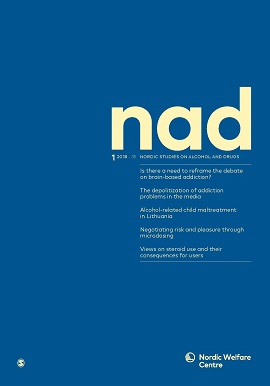NAD 1/2018 (February)

This issue of NAD deals with microdosing, alcohol-related maltreatment, gender differences among adolescents with substance abuse problems, media depictions of addiction problems, and the health service needs of users of anabolic androgenic steroids.
Alcohol-related maltreatment in child protection
Knowledge of the extent of alcohol-related maltreatment of children in Lithuania is limited. The study was based on a content analysis of child protection documents. More than one person with problematic alcohol consumption was identified in over a third of cases. Most often, it was the police (26.6%) or a close relative (16.3) who alerted the child welfare authorities about maltreatment.
Gender differences among young people with substance abuse problems
What are the similarities and differences in risk factors between boys and girls with addiction problems when they get into outpatient care? The study was based on interview data from 2169 youths over a three-year period from clinics in eleven Swedish cities. Girls came from more difficult family and childhood environments. They also had more likely problems at school, more difficult drug addiction and more serious mental health problems, while boys had much higher crime activity.
Psychedelic substances in tiny amounts
Micro dosing of psychedelic drugs is not about intoxication but about increased everyday function. The dosage is often about one tenth of the usual recreational dose. The 21 men in the thirties who participated in the interview study reported mainly positive experiences regarding mood, cognition and creativity.
Which voices are heard in media?
By analysing articles about addiction problems in daily newspapers in Poland, Italy and Finland, the study points to how reporting trends have changed since the early 1990s. More and more space is given to individuals with addiction problems and to researchers who represent a biomedical approach.
What do users of anabolic androgenic steroids want from health services?
The use of anabolic androgenic steroids can lead to increased muscle mass and strength, but also to unwanted side effects. In Norway, the specialized substance abuse treatment services are responsible for assisting users of anabolic androgenic steroids with health problems. The study points to how healthcare can become more accessible to this group. [The study is published in Norwegian but has an English language abstract]
Follow us on social media:


